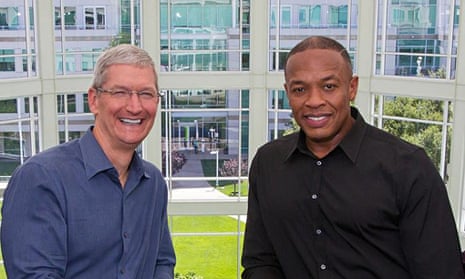This time last year Apple paid $3bn to acquire a company called Beats that made overpriced headphones and ran an unsuccessful music-streaming business. This acquisition made Beats co-founder Dr Dre the first hip-hop billionaire at the same time as it baffled many observers of the industry. For example, Benedict Evans, a seasoned analyst, tweeted: “If you think Apple’s lost it, Beats deal is confirmation. If you don’t, it’s… perplexing. Few really convincing rationales.” This columnist was likewise puzzled. Apple normally designs and makes its own kit, and if it wanted to do headphones it would certainly do better than the Beats products. So the conclusion had to be that if Apple didn’t want Beats for the headphones, it had to be the music-streaming service that it craved.
And so it has proved. We have just discovered – in a roundabout way – just how much Apple wants to get into the streaming business. It turns out that two US federal agencies – the Department of Justice (DoJ) and the Federal Trade Commission (FTC) – have been examining Apple’s business practices in relation to its forthcoming music-streaming service. The Verge, a well-known tech website, reported that Apple has been “pushing major music labels to force streaming services like Spotify to abandon their free tiers, which will dramatically reduce the competition for Apple’s upcoming offering”. DoJ officials had already interviewed senior music industry executives about Apple’s business practices, but it appears that the FTC (which oversees competition) has “taken the lead” in recent weeks.
It also turns out that (according to the Verge) the DoJ has had a resident monitor based in Apple’s corporate HQ since the company was found guilty in an ebook anti-trust case that had alleged that the company had conspired with publishers to raise the price of ebooks to consumers. Apple was fined $450m and is appealing, so maybe the DoJ minder is hanging around just to ensure that there is no more hanky-panky.
Are we surprised by this? Not really. Or at any rate, not as much as we would have been 15 years ago, when tech companies were really cool. We are now almost prepared to accept that the Apples, Googles, Facebooks and Microsofts of this world are really just behaving like the huge industrial conglomerates of the past. Of course they employ smarter people, pay them better, exude coolness, provide chic/funky work environments (free massage and sushi bars, anyone?). And they are led by executives who have good bedside manners. But at base they are just huge capitalist enterprises that exist to provide wealth for their leaders and shareholders. So the next time you see Jeff Bezos or Mark Zuckerberg, just remember that what you are looking at is John D Rockefeller v2.0.
Apple’s and Google’s recent adventures suggest that regulators are beginning to see the light. In the United States the FTC and the Department of Justice flexed their muscles. The FTC eventually backed off from launching an anti-trust suit against Google but, as we’ve seen, Apple’s attempt to control ebook prices was successfully challenged. In Europe, the European Commission successfully prosecuted Microsoft for monopolistic abuses, and has now started to call Google to account. And the European Court of Justice stunned everybody with its decision that Europeans had a legal right to request that objectionable material about them published online should be expunged from Google’s search indexes within the 28 countries of the European Union.
What was really intriguing about this so-called “right-to-be-forgotten case” was the company’s response. Having experienced some of that response in conversation with people “with knowledge of the matter” (as the Washington Post coyly puts it), I saw a reaction that evolved through four distinct phases. The first was utter shock: nobody in Google or its extensive legal team expected the court to find against them, and so they were psychologically unprepared for it. The second was gibbering rage – how dare clueless European institutions try to impose antique laws on a progressive global company! The third phase was characterised by a kind of technocratic contempt: harassment of Google by European regulators and courts merely highlighted the extent to which Europeans were locked in the past and hostile to innovation. (Implication: Google = innovation.) And, then, finally, there was resigned acceptance followed by deployment of Google’s superb technical resources to invent an efficient way of complying with the ruling. To date, this system has dealt swiftly and efficiently with nearly a million requests/demands.
All of which is good news for society, even if it’s a pain in the arse for the new masters of the technological universe. And the message for Silicon Valley is this: there is such a thing as society, and you need to play by its rules.

Comments (…)
Sign in or create your Guardian account to join the discussion